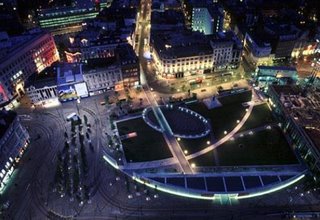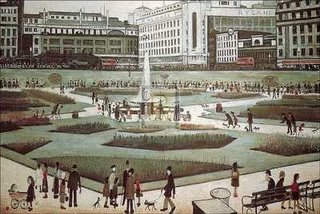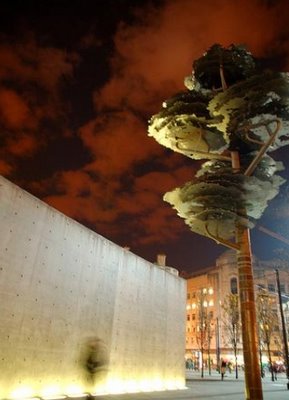Any visitors guide, travel column or holiday show will recommend a little research prior to embarking on your journey. In order to get the most out of your time away it's generally good advice to spend a little time at home reading up on what your destination has to offer, that way you spend less of your vacation time seeking out what's available and trying to locate it. However, sometimes, for some cities, the leaflets available in travel agent's offices and articles published on tourist information internet sites offer a somewhat biased view. While not being categorically false much of what you may read will be half truths, white lies or blinkered reflections of reality.
Take for example the beautifully vague:
"Piccadilly Gardens, Manchester
Winner in an international competition"

I'm prepared to admit that, from this view, the centre of

As tourist fluff goes most of Manchester's tourist copy reads like my CV of 10 years ago, convinced, as I was, that my gold membership to Blockbuster put me in a unique and authoritative position to dominate the film industry within 6 months. With genuine sentiment I had written a resume that proclaimed "I am an dynamic, hardworking team-player with a mature professional attitude and the drive necessary to succeed" - so far so good - but not being completely naive I realised that perhaps it was necessary to offer something more than neologisms of corporate speak in order to get my first job. I continued with the more intimate "I am very smartly dressed, clean shaven and my personal hygiene is second to none", thinking that perhaps my ability to wash would attract the image conscious media crowd. Left here, this would probably have been enough to have someone take pity on my adolescent stupidity, but I felt that I could offer more. With the blind ambition of youth I tried to stretch my meagre skills that little bit further than was strictly true; "I intimately understand the requirements of a modern cinema audience and am able to provide all of the necessary skills required in the film industry". It was blatantly obvious to anyone who had set foot on a film set that I lacked any skills of any use whatsoever, other than perhaps my dedication to cleanliness. In many ways I think this stage of adolescent confusion, without direction and without a reflexive self-awareness, is where Manchester finds itself today – other than perhaps the cleanliness.
The changes violently set in to motion by the IRA, at around the same time I was providing TV producers with excesses of scrap paper, gave an opportunity for rebirth. The resulting redevelopment becoming, without a doubt, the driving force behind the renaissance Manchester currently finds itself in, those grim northern landscape depicted by L S Lowry that perpetuated through to the lyrics of The Smiths disappearing into memory.

Piccadilly Gardens, L S Lowry, 1954

Engin ummæli:
Skrifa ummæli